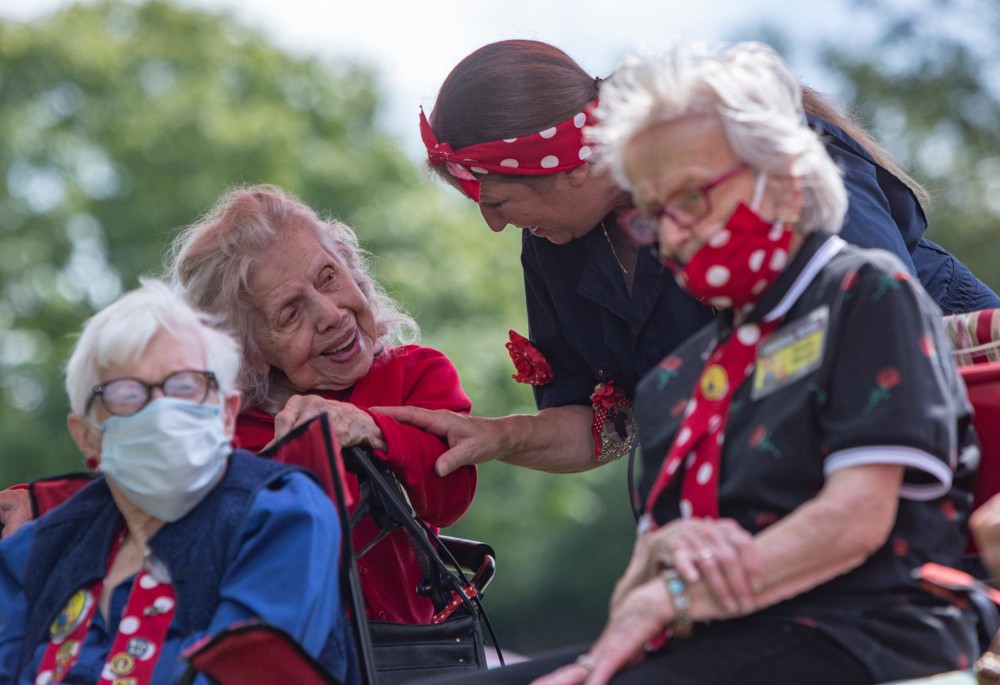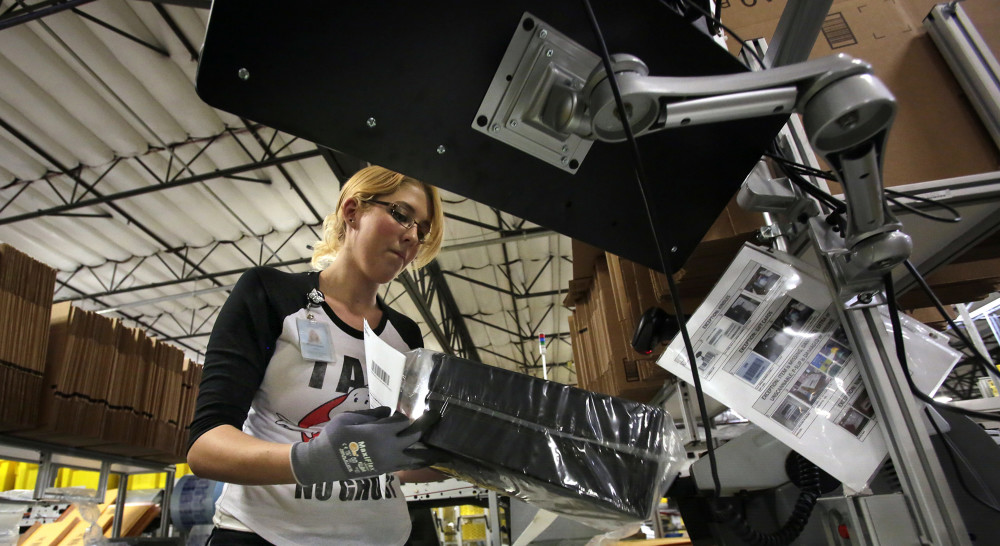By Nisa Khan
Detroit Free Press
WWR Article Summary (tl;dr) The Rosies and veterans gathered on Labor day to remember their contributions during WWII. They then told stories from the front lines. One Rosie said that back in the day, she was shocked at the idea of wearing pants to work.
Detroit
Ten members of the Greatest Generation attended a gathering Labor Day afternoon in Ypsilanti’s North Bay Park that honored them and dedicated 10 rosebushes to the working women of World War II.
The event was organized by the American Rosie the Riveter Association, where 30 people, including seven Rosies, two WWII veterans and one male factory worker were in attendance.
Members of the association wore blue overalls and red bandannas, signature looks from Rosie’s iconic posters.
Ypsilanti Township considers itself to be the home of Rosie the Riveter. The original Rosie, Rose Will Monroe from the WWII newsreels, worked at the aircraft manufacturing Willow Run Bomber Plant in Ypsilanti Township. It was one of the largest factories of its time, built under two years. In 2018, Ypsilanti made it into the Guinness Book of World Records for the most people dressed as Rosie the Riveter at a gathering.
Speakers included association members, including Michigan Director Nancy Zajac, and family members. Daughters of a Rosie are called rosebuds while sons are called rivets — one rosebud, Vivienne Larsh, spoke of her mother’s life, calling her a “true factory rat at heart”.
Ypsilanti Township Supervisor Brenda Stumbo also attended the event. She told the crowd General Motors planned to tear down the plant, but the Yankee Air Museum and Stumbo managed to convince them to keep the building to remember the women of Ypsilanti’s history.
“It is because of you that I’m elected, that I had the opportunity to (be elected). You paved the way for women,” Stumbo said. “You were the first to do that. For equal pay in the workforce for people who never worked in a factory. Women never worked in a factory until then. People of color didn’t work in a factory until then. And that’s our history and we are so proud of it. And we will do whatever we can to honor and preserve the history of Rosie the Riveter.”
The Rosies and veterans then told stories from the front lines. One Rosie said she was shocked at the idea of wearing pants to work. A veteran recalled being shot down from the sky in northern Italy and receiving notes from Rosies back home full of profanities toward Hitler. One woman said she had never been kissed by so many people as she had been in New York Times Square when the war was over.
The eldest Rosie was Phyllis Lenhard at 101. She told the crowd of her time managing 35 engineers and becoming acquainted with Henry Ford’s family. Her son, Daryl, said his mother was too thin to manage some of the equipment, but managed to get ahead because of her typing and spelling skills.
The association plans to have more than 100 rosebushes dedicated to the Rosies across southeast Michigan. The rosebushes are usually sponsored by surviving family, friends or a supporter of the women. Johanna McCoy, the owner of the Bomber Restaurant, sponsored many of the roses.
“In these troubling times where we have no one to turn to for advice, it is the knowledge of you, my dear ladies, that keeps me going,” McCoy said. “One cannot profess to be a modern-day Rosie and quit. It is not in our DNA.”
The crowd rang small bells to honor the women at 1 p.m., the same time as other events across the United States and other countries such as the Netherlands.
Clara Doutly, 98, was one of the working women who had a rosebush dedicated to her. Doutly is from Detroit’s west side and worked at Briggs Manufacturing Company on the east side of the city.
“We made a lot of money, too, back then,” she said. “$1.25? That was a lot of money.”
Doutly’s sponsor, Tamara Wiley, has been a server at the Bomber restaurant for the past 10 years. Wiley met Doutly at a test run of the Guinness World Record event. In a sea of people, Wiley said Doutly caught her eye and beckoned her over.
Ever since, Wiley said she and her daughters have heard amazing stories from Doutly about her time as a teenage girl during the war. When the rosebushes were first announced, Wiley jumped at the opportunity.
“It is something to tell my kids when we visit the park,” she said. “I always tell them about the rosebush and I tell them about Clara. It’s almost like a legacy that is being continued and especially during the times that we are in now, you really don’t know where you are going until you know a little bit from your past.”
___
Distributed by Tribune Content Agency, LLC.
















































































































































































































































































































































































